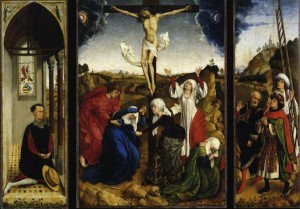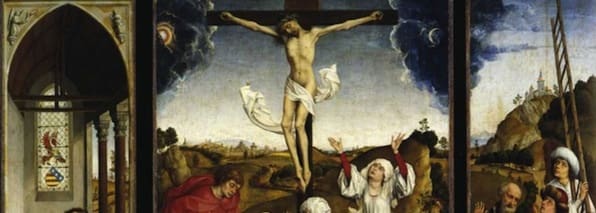We are taught to believe as Catholic Christians Jesus died for our sins,” yet that is not  the reason he was killed. He was killed by the Jews because he was a threat and a heretic, and by the Romans who saw him as a threat to their own authority. Why are we taught as we are?
the reason he was killed. He was killed by the Jews because he was a threat and a heretic, and by the Romans who saw him as a threat to their own authority. Why are we taught as we are?
Good question–which I will now try to answer to your satisfaction. But first, let me back up a bit and run through some of the (very) ancient history underlying behind your question. The most fundamental answer is that Christ’s death was the means to redeem mankind from the Original Sin of our first parents, Adam and Eve. That sin left us as damaged goods incapable of enjoying God’s original plan: that we live in an earthly paradise and then enjoy his presence in heaven. To put it bluntly, Adam and Eve did us in with the diabolical help of the Serpent. You might ask them for a blow-by-blow account when you get to heaven. No doubt they repented, but I don’t think they are at the top of the celestial pyramid.
Now let’s move a bit closer to the heart of the matter: Why, then, did Jesus die? Well, because of God’s love for his creatures (that is us). Remember, we are made in his image and likeness. We are his children and what good Father does not want to see his children, holy, happy, and joyful, even if they have seriously displeased him?
But how could that Original Sin be pardoned, given the gravity of the crime against God? Here we arrive at the great triune mystery of God only unveiled with the coming of Christ. Our Father God is not alone in his Godhead but has a Son and a Spirit. Together in eternity, they are three in one God. I will not go further into the Trinitarian dogma of the Church, as it is off topic. (You recite the Creed every Sunday any case.)
Suffice to say that according to our Church each member of the Holy Trinity has a special task attributed to that member. And the Son was sent particularly by His Father to redeem us from the Original Sin of our renegade parents so heaven would be open to us. The Son became one of us while remaining God because such an egregious crime of rebellion against God could only be forgiven by the sacrifice of the God-Man Jesus Christ, our Lord and Savior.
Now let’s go to the big hitter in explaining knotty questions of our faith–the Catechism of the Catholic Church. After all, this is the Year of Faith, which in part celebrates the publication of this great offshoot of the Second Vatican Council, completed a few decades after its close. (By the way, a little advice: Try to always to take the Catechism of the Church and a pocket New Testament with you in case an evangelizing moment presents itself. You will be well-armed for a pleasant discussion and may save some souls while you are at it.)
But back to business, as we close in on the heart of your question. First, read the Catechism’s paragraph 599 on your own. Now slowly read paragraph 600 of the Catechism of the Catholic Church:
To God all moments of time are present in their immediacy. When therefore he establishes his eternal plan of “predestination”: he includes in it each person’s free response to grace: “in this city, in fact, both Herod and Pontius Pilate, with the Gentiles and the people of Israel, gathered together against your holy servant Jesus, whom you anointed, to do whatever your hand and your plan had predestined to take place.” For the sake of accomplishing his plan of salvation, God permitted the acts that flowed from their blindness.
In other words, God’s plan to redeem the human race and open the gates of heaven took into account the motives and actions (foreseen in God’s eternal present) of all the players, including “Herod and Pontius Pilate, with the Gentiles and the people of Israel.”
+
Art for this post on Why did Jesus Die?: Triptych: The Crucifixion, Rogier van der Weyden, from 1443 until 1445, PD-US published in the U.S. before January 1, 1023, author’s life plus 100 years or less, Wikimedia Commons.


